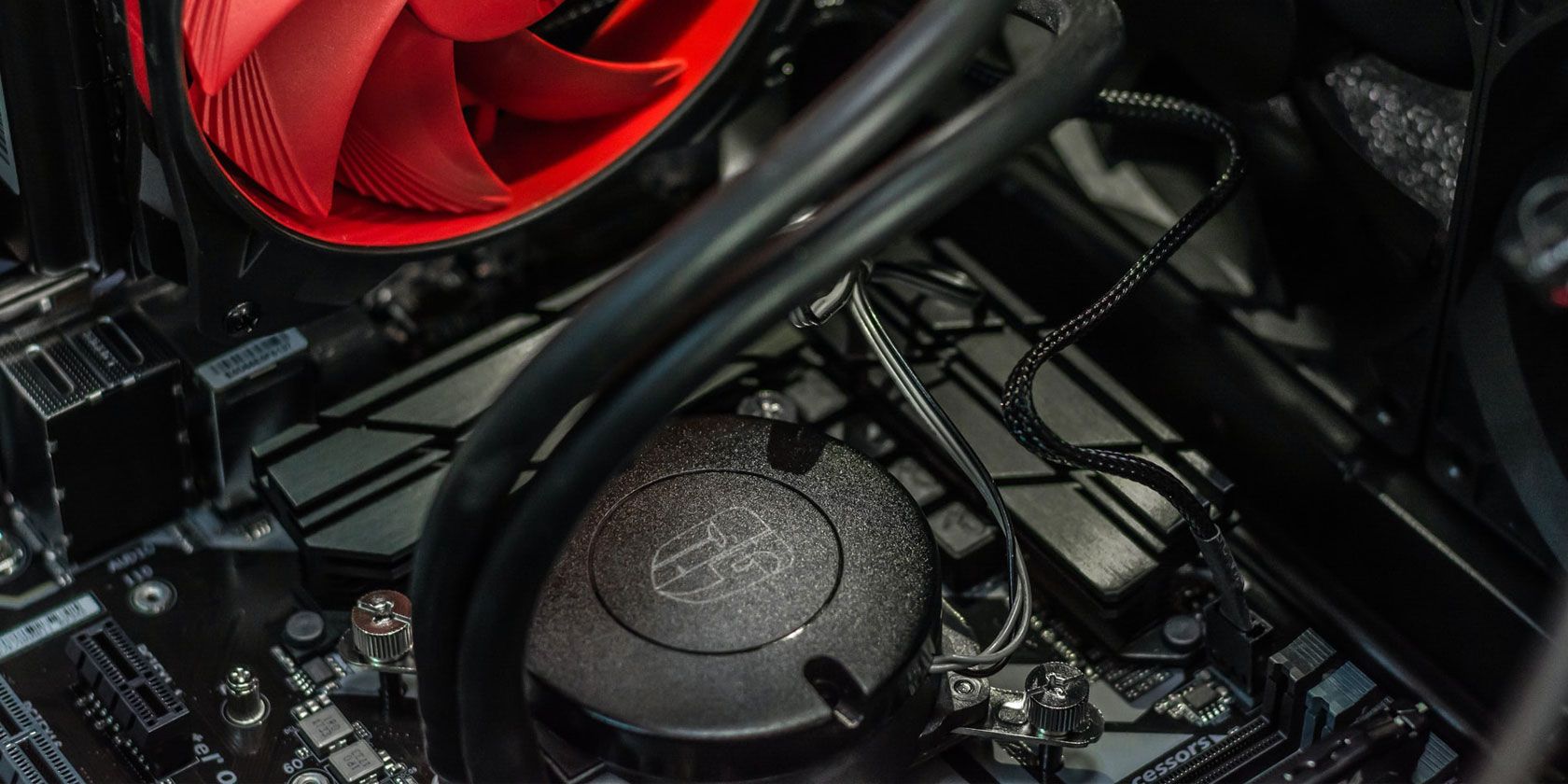You may have heard about CPU water cooling, also known as liquid cooling, but may have never tried to explore what it means or how it works.
Let’s look at how CPU water cooling compares to regular air cooling, if water cooling is any better, and if there are any downsides.
What Is CPU Water Cooling?
Just like a car, water cooling is basically a radiator for the CPU inside your computer. It passes water through the heat sink, where the heat transfers from your processor to the water cooler.
As the water gets hot from the heat of your processor, it moves out to a radiator at the back of your case and transfers the heat to the ambient air outside of your computer case. Finally, the cooled water comes back, and the process continues.
The process of water cooling is much more efficient than air cooling through its heat dissipation method of circulating the hot water outside the case and bringing in the cooled water to keep your CPU temperatures low.
Water Cooling vs. Air Cooling
So, what is the best way of keeping your CPU cool?
First of all, a water cooling system is more efficient than the regular process of air cooling. Secondly, it allows for higher processor speeds because the CPU’s ambient temperature is now much more stable and controlled.
A by-product of water cooling can sometimes be an overall cooler computer case. The water cooler moves heat directly outside the case, rather than an air cooler or fan system that cools the CPU but doesn’t reduce overall heat build-up.
This is why gamers who like to overclock their CPUs use nothing less than water cooling for their PCs. You can even double the processor speed in some cases by using more advanced and complex water-cooling solutions, though this is rare.
Another benefit of using water cooling instead of air cooling is that it reduces the fan noise you have to deal with when your PC is under heavy loads. When your fans are running at 5,000 RPM, it’s almost impossible to avoid fan noise, leaving you with water cooling as the only option you can opt for.
Disadvantages of Water Cooling
To work effectively and efficiently, water cooling kits require more space than your average air cooling fan. A CPU water cooling kit needs space for its impeller, the fluid reservoir, tubing, fan, and power supply.
You’ll have to get a bigger case than you’d need if you were to go with air cooling instead.
It is possible, however, to have most of the air cooling system outside your PC case. But, it’s not recommended, as it’d then take up space around your desktop, which may not be a good thing if you have a small computer desk.
While newer closed-loop water cooling technologies have improved the space requirement, it still is more space than an air cooling fan needs.
Another problem with newer closed-loop water cooling systems is that they can only cool a single component. If you need to cool a CPU and a GPU, you’ll need a separate water cooling system for each.
If the water cooling system isn’t installed properly, it could cause damage to the components. It is, therefore, important to get someone to do it for you who has a significant level of technical and PC building knowledge.
Is a CPU Water Cooling Kit Worth It?
For most people, air cooling is still the most prominent cooling system because of its ease of use and how little it costs compared to water cooling systems. However, as water cooling systems continue to advance and get smaller in size, they’re going to become more common in desktop computers.
Now that there are closed-loop water cooling systems, it’s very easy to install one on your computer, as they require almost zero maintenance.
You may not get the same performance out of a closed-loop water cooling system as you would with a custom-built system, but they come with very little risk. However, compared to a regular air cooling system, a closed-loop water cooling system still has more performance and benefits.
Some of the top tech companies are even investigating water cooling systems for some high-end laptops, which could give a gaming laptop an insane performance boost if this ever becomes a reality.
For now, water cooling is only found in high-performance desktop computers built by high-end PC builders and gamers.
CPU Water Cooling Systems FAQs
If you’re new to the world of computer water cooling, you probably have many questions, such as “Will the water cooling wreck my CPU?” Read on for answers to some of the most common questions regarding CPU water cooling.
Can I Install a Water Cooling Kit Myself?
Nope, you shouldn’t! At least, not straight away.
If you’re asking this question, you likely haven’t installed a water cooling system before. If that’s the case, you should watch several installation guides on the subject before installing your own water cooling kit.
However, if after watching some videos, you still feel uncertain, don’t worry! The best option is to ask someone to do it for you. Remember to ask lots of questions along the way if possible. Then you’ll know what to do next time.
Do You Use Regular Water for CPU Water Cooling?
Yes, you can use regular tap water in your water cooling system, but if you can, use distilled water. Distilled water is the purest water there is. It won’t cause any issues, which normal tap water may due to its impurities.
Is CPU Water Cooling Risky?
By itself, it’s not risky. But poor implementation can make water cooling risky for your computer’s components, for example, if the cooling liquid leaks because you didn’t fit something properly. This is why it’s recommended that you get an expert to install it for you, especially if you’re installing it for the first time.
What Happens If the Water Leaks?
A leak is the worst thing that can happen to your water cooling system and your computer.
Loose-fitting components are one of the main causes of leakage, along with cracked or blocked tubes. It can potentially cause you a loss of hundreds of dollars by damaging your PC’s components.
It’s recommended that you triple-check the water cooling system after installing it and run it for 24 hours to see if there are any leaks. You don’t want to find out that there was a leak after installing it into your computer.
Here’s what to do next if you spot a leak:
- Turn off the PC immediately
- Unplug the power cable from the socket
- Open your PC case
- Insert paper towels to soak up the leaked water
- Take out all the components hit by water
- Carefully dry each of them
- Leave everything out for 24-48 hours until fully dry (or longer if possible)
- Put everything back into its place
Water damage doesn’t always render your hardware immediately irrecoverable. Switching the power off as quickly as possible is vital, though, as the interaction of water and electricity is what causes the most damage, followed by corrosion of parts.
So, Which Cooling System Should I Use?
If you want to research and begin using a CPU water cooling system, make sure to take time to research the correct parts. Furthermore, don’t be afraid to ask for help with installation. If installed correctly, your water cooling kit will help to keep your CPU and other components cool, potentially extending the lifespan of your hardware.
About The Author

